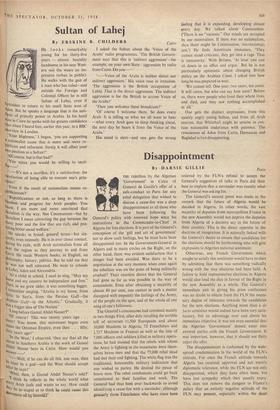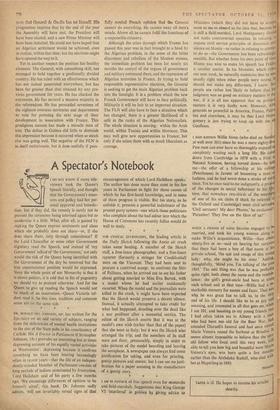Disappointment
By DARSIE GILLIE Paris THE rejection by the Algerian 'Government' in Cairo of General de Gaulle's offer of a safe-conduct to Paris for any rebel delegation that wished to discuss a cease-fire was a deep disappointment to all those who have been following the General's policy with renewed hope since his instructions to the Commander-in-Chief in Algeria for free elections. It is part of the General's conception of the 'gift and art of government' not to show such feelings, but he must have been disappointed too. In the Government-General in Algiers and in many circles on the Right, on the other hand, there was evident satisfaction that a danger had been avoided. Was there to be a negotiation at the very moment when once again the rebellion was on the point of being militarily crushed? Their reaction shows that the General had gone as far as was possible in the way of concessions. Even after obtaining a majority of almost 80 per cent, one cannot in such a matter disregard with impunity the feelings of the Army, of the people on the spot, and of the whole of one wing of one's followers.
The General's concessions had consisted mainly in two things. First, after duly recalling the terrible toll of terrorism (1,500 Europeans and about 10,000 Moslems in Algeria, 75 Frenchmen and 1,717 Moslems in France) as well as the loss of 7,000 officers and soldiers killed in military opera- tions, he had insisted that the rebels with whom the Army is fighting in the mountains were them- selves brave men and that the 77,000 rebel dead had met their end fighting. The white flag was the traditional, honourable military indication that one wished to parley. He desired the peace of brave men. The rebel combatants could go back unmolested to their families and work. The General had thus bent over backwards to avoid identifying a cease-fire with a surrender, although precisely those Frenchmen who have since been relieved by the FLN's refusal to accept the General's suggestion of talks in Paris did their best to explain that a surrender was exactly what the General was asking for.
The General's second point was made in the remark that the future of Algeria would be decided in Algeria. In other words, the vast majority of deputies from metropolitan France in the new Assembly would not deprive the deputies from Algeria of a decisive say in the future of their country. This is the direct opposite to the doctrine of integration. It is naturally linked with the General's desire to ensure that candidates for the elections should be forthcoming who will give expression to Algerian national sentiment.
Otherwise, any French Government which sought to satisfy this sentiment would have to start by admitting that there was something radically wrong with the way elections had been held. A failure to hold representative elections in Algeria would also load the dice in favour of the Right in the new Assembly as a whole. The General's immediate aim in giving his press conference was no doubt to obtain from the FLN the neces- sary degree of tolerance towards the candidates for the new elections. Anything more than a de facto armistice would indeed have been very satis- factory, but an advantage over and above his immediate objective. It was not even essential that the Algerian 'Government' should enter into avowed parley with the French Government. It was important, however, that it should not flatly reject the offer.
The disappointment is cushioned by the wide- spread condemnation in the world of the FLN's attitude. For once the French attitude towards Algeria has received approval and not merely diplomatic tolerance, while the FLN are not only disappointed, which they have often been, but have lost sympathy which they ysually enjoy. This does not remove the dangers to France's policy that an, entirely negative attitude of the FLN may present, especially within the short term that General de Gaulle has set himself. His programme requires that by the end of the year the Assembly will have met, the President will have been elected, and a new Prime Minister will have been installed. He could not have hoped that an Algerian settlement would be achieved, even in outline, within that time; but the elections might have opened the way to it.
Yet in another respect the position has healthy elements. The General, with astonishing skill, has managed to hold together a profoundly divided country. He has ruled with an effectiveness which has not indeed penetrated everywhere, but has been far greater than that attained by any pre- vious government for years. He has checked the extremists. He has secured a massive majority in the referendum. He has persuaded seventeen of the eighteen overseas territories and departments to vote for pursuing the next stage of their development in association with France. This prodigious success has made a miracle man of him. The defeat in Guinea did little to diminish this impression because it occurred when so much else was going well. The negative of the FLN is in itself unfortunate, but it does usefully if pain- ain- fully remind French opinion that the General cannot do everything. He cannot sway all men's minds. Above all he cannot fulfil the functions of a responsible citizenry.
Although the crisis through which France has passed this year was in fact brought to a head by the Algerian .problem, in the sense of the bitter discontent and rebellion of the Moslem masses, the immediate problem has been for nearly six months the control of the organs of government and military command there, and the repression of Algerian terrorism in France. In trying to hold responsible representative elections, the General is seeking to get the main Algerian problem back into the limelight. It is a problem which the new French Government will have to face politically. Militarily it will be heir to an improved situation. The FLN will also have to face a situation whiCh has changed; there is a greater likelihood of a split in the ranks of the Algerian Nationalists. The whole situation is moving: within the Arab world, within Tunisia and within Morocco. This may well give new opportunities to France; but only if she seizes them with as much liberalism as courage.



































 Previous page
Previous page